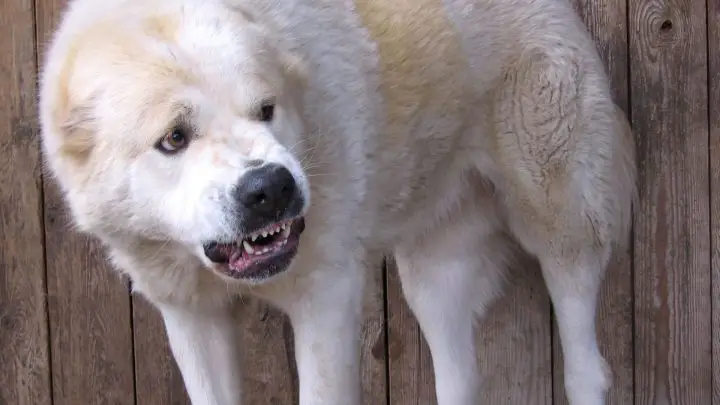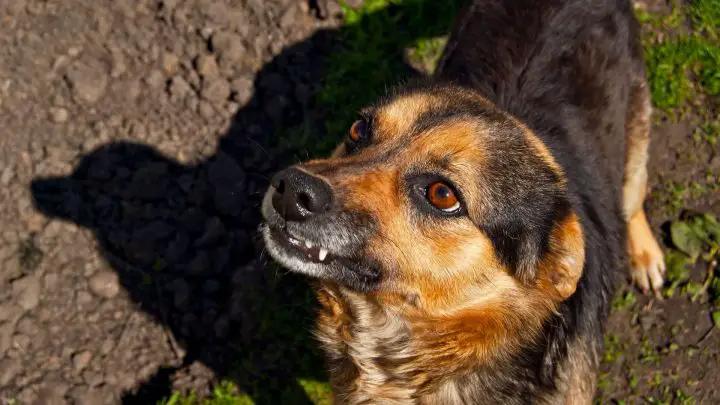Do you often find yourself asking ‘why is my dog growling at nothing’? Are you worried about a paranormal presence? Want to set your mind at ease? Then we have the balm to your worries, for we will be looking today at some of the most common reasons your dog might be growling at what appears to be nothing.

tabla de contenidos
Some Explanations
There is a wide cavern between the sensory capabilities of a dog and its owner. Dogs simply have far stronger powers, at least in terms of what they can hear and smell.
And yet, for all their sensory dominance, dogs lack any natural way to communicate what they can sense besides barking, growling, whimpering, etc.
That being said, here are a number of things that might be causing that growling in the first place. No matter what, it can be incredibly disconcerting when a dog is seemingly reacting to nothing, so hopefully these few reasons can put you at ease a little.
Seeing Something That You Cannot
This is not quite as spooky as it sounds, sadly.
Though dog vision is commonly thought to be a little lackluster – at least in terms of their strong and adept senses of smell and hearing – they are actually more skilled than you might think.
Thanks to certain studies in the field, we have been able to see that dogs automatically adopt a rather different mode of seeing when darkness falls, perhaps due to their evolutionary lineage from wolves.
In the darkness, a dog will become more alert, and notice slight motions far more clearly, in turn becoming more attentive to their environment, through their eyes and through their other senses too.
They can, thus, detect changes in things in the distance to such a sensitive degree that we humans might feel as though they are reacting to nothing. It is not hard to see how this might be a little disconcerting. I, too, have often been drawn to thinking about paranormal activity and the like.
Dogs are inherently social animals – some more than others of course. Seeing as the number of ways a dog can communicate with its brethren is fairly limited, growling is one that can come to be used in a variety of ways depending on the attitude and the context.
If you are out with your dog and it seems like they are growling at nothing, they might just be communicating with another animal that you can’t see yourself. This animal might have sped by, chasing after something else that you can’t see.
The dog might be communicating with them or it might even be trying to alert you of their presence in the case that you might not have seen them.

Hearing What You Cannot
As we ought to already know, dogs have incredibly sensitive hearing, often to a fault. We only have to see how a dog reacts to firework season to know just how much of an encumbrance this can be.
This is even the case in a domestic environment when seemingly nothing is occurring. Dogs can hear not only louder than humans but can also hear from much further away, detecting the sounds of animals, objects, and people. They sure would make good spies, would they not?
So, if your dog is barking at thin air, there is a chance they might just be reacting to something that they have heard in the far distance. Something that you might not be able to see yourself but that is definitely there, somewhere.
If you are curious as to the source, then it could be for a whole number of reasons. In a domestic environment or suburban neighborhood, very often the sound of a neighbor’s car arriving home, for instance, is enough to set your furry friend off.
Feeling Frustrated
It is quite typical of a dog to whine when they are feeling upset or frustrated. Though this can actually escalate to barking and growling should it feel that its frustrations are not being satiated or that the situation is escalating.
Often, these growls are very short and do not keep happening, emitted under the dog’s breath almost like an afterthought.
This can be for a number of reasons, ranging in their impact from the short term (losing a ball underneath a table) to the long term (genuinely being upset with you).
You can tell if their frustrations are directed towards you by assessing whether or not they also conform to these other symptoms:
- Avoiding you.
- Staring excessively and repeatedly – why does a dog stare at you exactly?
- Urinating on your belongings and furniture.
- Hiding under your bed away from you.
- Scratching their paws at you, or scratching you with their paws.
- Behaving in a generally less affectionate way towards you.
- Chewing and mangling your belongings – often the case with footwear.
Urination in particular is a sure way to tell whether a dog is comfortable or not. The fact that they cannot help but pee is a sign that they cannot hold in or manage their fear and discomfort. This discomfort could be caused by you or something else, but it is worth paying attention to.

Feeling Fearful
No matter the situation or the context, a dog’s first instinct when in fear of danger is to growl. We can think of this growling as being similar to a boiling kettle – sooner or later is it going to blow, and so we must act accordingly.
If a dog is growling but sitting, then we have a chance to view another interesting aspect of a dog’s psychology. A dog sits when it is subjugated and obeying orders. Doing this while growling sees a dog performing this action in the hope that the thing that they fear will go away if they behave and sit still.
Loud noises are known to get a dog in a fuss. A younger dog who has not experienced such things before might even begin panicking. Those who are older will still usually react by growling. But they are also likely to sit, indicating that they are willing to compromise so that it will go.
Malady
If a dog is sick, its reactions might be a little jumbled. It might growl or react badly even when an owner is passing on some affection.
If the dog has not obviously been injured on the surface, try and check for some of these other issues elsewhere:
- Vomiting and nausea
- Lethargy and tiredness
- Restlessness
- Loss of appetite and/or decreased water intake
- Reduced interaction with other dogs or humans
- Blood in feces or urine
Restlessness is a sign of anxiety. So mixed with intermittent growling, you surely have your answer as to how a dog is feeling. Knowing when to take a dog to the vet is a difficult thing indeed.
Equally, a dog might be seriously sick, to the point of no return. In cases of dementia in dogs, for example, dogs have been known to bark and growl at nothing. Affecting a dog’s memory, dementia can have a dog negatively anticipating its surroundings, growling, and shaking in response.

Attention-Seeking
Above all, growling is inherently a way for a dog to grab your attention, no matter the inherent reason. Often, the dog does not even know it themselves.
Dogs are inherently attention-seekers – I, and many others, often think of them as simply furry babies. Thus, they will use whatever communicational means they have to let you know that they are feeling neglected.
You might, for example, not be home enough. Or not giving the dog in question enough attention – you might even be showing another dog too much attention.
Relationships between dogs and humans are more or less incomplete without affection. This is a foundational part of being a dog owner, after all.
Growling can be a way for a dog to let you know that you need to direct your attention towards them. But it can also be a way for them to let you know that you need to direct your attention elsewhere. This is in the case of a trespasser, for instance.
Pay close attention to where the dog is looking and make your own judgment.
Aging Away
When a dog is a certain age, they no longer have as much energy to communicate in all the myriad ways that it might have done in its youth.
This means little to no wagging of the tail or jumping around. Rather, it will use its voice, growling and barking more often to let an owner know how it’s feeling.
Growling simply comes to mean different things as a dog ages. When it once meant that a dog was wanting to immediately alert an owner of something, it might later come to simply be a sign that a dog is hungry.
Adjust your behavior accordingly.
Last Bark
Entonces, ¡ahí lo tienes!
Hopefully, you understand your dog a little better now. Perhaps, it was not growling at nothing after all and instead could see a little more than you could.
preguntas frecuentes
When a dog growls at something you can’t see, it might be due to various reasons related to their senses, instincts, and behavior. Dogs have keen senses, including a strong sense of smell and hearing, which can detect things that might not be immediately obvious to humans.




